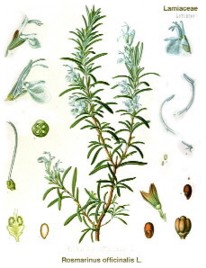Rosemary: The Rite Herb
By Audrey Stallsmith

There's rosemary, that's for remembrance.
Pray you, love, remember.
Hamlet Prince of Denmark, William Shakespeare
Rosemary may also stand for remembrance because it "recalls" its color and scent so well. "For you," a character in The Winter's Tale comments, "there's rosemary and rue; these keep/ Seeming and savour all the winter long. . ."
The herb was originally carried to funerals simply as a protector against infection. It soon became customary, however, for mourners to drop sprigs of it onto the coffin as a promise that they would not forget the deceased. Woven into the bride's wreath at Tudor weddings, it reminded the happy couple not to forget their vows also.
It was so closely associated with marriage, in fact, that the nurse in Romeo and Juliet could ask, "Doth not rosemary and Romeo begin both with the same letter?" This may be due to its supposed empathy with Venus, the mother of romantic love (Eros). Like the herb, she was also supposed to have sprung from the sea. Unfortunately, later in Shakespeare's play, the friar has to adjure Juliet's mourners to "Dry up your tears, and stick your rosemary/ On this fair corse."
Perhaps because of its association with sacred rites, rosemary gained a reputation as a holy plant. Considered efficacious against black magic, it docorated church festivals, especially those celebrating Christ's birth. "Down with rosemary and so," writes the poet Herrick. "Down with the baies and mistletoe,/ Down with the holly, ivie all/ Wherewith ye deck the Christmas hall."
A charming tradition holds that the Virgin Mary threw her blue cloak over a rosemary bush during the flight into Egypt, transforming its formerly white flowers. For this reason, the Spanish call it romero, the pilgrim's flower, and contend that it will never presume to surpass the adult height of Christ.
An old manuscript sent to Queen Phillippa of England by her mother claims that rosemary "mighteth the boones and causeth goode and gladeth and lighteth all men that use it. The leves layde under the heade whanne a man slepes, it doth away evell spirites and suffereth not to dreeme fowle dremes ne to be afeade. But he must be out of deedely synne for it is an holy tree. Lavender and Rosemary is as woman to man and White Roose to Reede."
This association of rosemary with masculinity seems to be directly contradicted, however, by another old belief that the herb would only thrive where the woman of the house ruled the roost. I suspect that many bushes were subjected to surreptious snippings!
Meaning "dew of the sea," rosemary has also been called polar plant, compass-weed, or incensier, the latter because it sometimes took the place of more expensive incense.
The ancients burned rosemary, often along with juniper berries, not just for the pleasant smell, but as a disinfectant. Strewn along with rue in the dock at trials, rosemary protected spectators from gaol-fever.
Gerard describes the herb as "a wooddy shrub, growing oftentimes to the height of three or foure cubits, especially when it is set by a wall: it consisteth of slender brittle branches, whereon do grow very many long leaves, narrow, somewhat hard, of a quicke spicy taste and whitish underneath, and of a full greene colour above. . .among which come forth little floures of a whitish blew colour. . ."
Rosemary can be propagated by seeds, cuttings, layering, or division of roots. Those plants which I have grown from seed seemed to be stockier and more vigorous than those taken from cuttings.
Rosemary grows best in light, dryish soil with a sheltered location and full sun. It doesn't usually survive northern winters, but one variety, Arp, is hardy to Zone 6.
Hungary water, rosemary distilled in wine with sage and other spices, was used to treat paralysis, arthritis, and gout. A rosemary wash rubbed into the scalp supposedly stimulates hair growth and prevents dandruff. Rosemary tea soothes headaches, colic, colds, and nervous disorders, and disinfects sore gums or throat. It is also said to raise the blood pressure so, as with any herb, don't overdo. Once used to flavor liquors, rosemary more commonly spices meat dishes these days.
I think the ancients had the right idea when they associated goodness with this robust invigorator. "Make thee a box of the wood of rosemary," Banckes Herball advises, "and smell to it and it shall preserve thy youth." May your own goodness keep you young eternally!
Plant plate is from Kohler's Medizinal Pflanzen, courtesy of the Missouri Botanical Garden Library.








